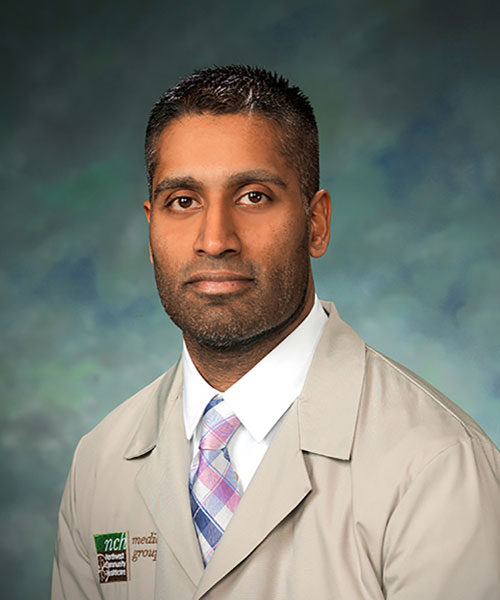The mystery of Parkinson’s disease
April 15, 2021

Parkinson’s disease is not uncommon in the United States – about one million people have Parkinson’s and more than 50,000 new cases are diagnosed each year. And yet the cause of Parkinson’s remains unclear, and its debilitating impact on patients can vary widely. Many of us may know someone with Parkinson’s and yet still feel it is a mystery.
“Parkinson’s disease is treatable,” NCH Medical Group Neurologist Saju Abraham, M.D. emphasizes, “but it is a serious neurological disorder that affects the body’s movement and can include tremors and trouble walking.”
Dr. Abraham answers some basic questions about Parkinson’s to try to help us unlock the mysteries behind this disease.
Q: Do we know what causes Parkinson’s disease?
Dr. Abraham: While we haven’t established a clear cause to Parkinson’s, we do know that many things contribute to its onset, including genetics, environmental triggers and trauma. What usually happens is that dopamine (also referred to as a chemical messenger) producing cells breakdown causing abnormal brain activity leading to the disease.
Q: We hear a lot about screening and early intervention for other serious conditions, but are there screening options available for Parkinson’s?
Dr. Abraham: At this point, there is no screening method that is readily available to the public. A doctor trained in nervous system conditions (neurologist) will diagnose Parkinson’s disease based on medical history, a review of signs and symptoms and a neurological and physical examination.
Q: Is there any way to prevent Parkinson’s disease?
Dr. Abraham: Because the direct cause is unknown, concrete ways to prevent it are also unclear. Anecdotal data has suggested that exercise and caffeine use might be somewhat protective, but there haven’t been any large studies to confirm this.
Q: What are some signs and symptoms of Parkinson’s disease?
Dr. Abraham: The common symptoms of Parkinson’s are a tremor that occurs at rest, stiff muscles and trouble with balance. But there are many other conditions that could cause similar symptoms, so a detailed evaluation by a neurological specialist well-versed in Parkinson’s diagnosis and management is critical when symptoms begin.
Q: Can you live a full life with Parkinson’s disease?
Dr. Abraham: While Parkinson’s disease itself isn’t fatal, the complications that could arise from late-stage Parkinson’s such as falls or infections related to decreasing mobility are often the risk factors for decreased life expectancy.
Q: Does NCH treat Parkinson’s disease patients? What types of treatment and/or services could a patient with Parkinson’s disease get at NCH?
Dr. Abraham: NCH neurologists are trained in evaluation, diagnosis and management of Parkinson’s disease. There are wide variety of pharmacological and non-pharmacological treatments that are offered at NCH including medications, therapy and pre-surgical/surgical options.
Dr. Saju Abraham can be reached at 847-725-8401.